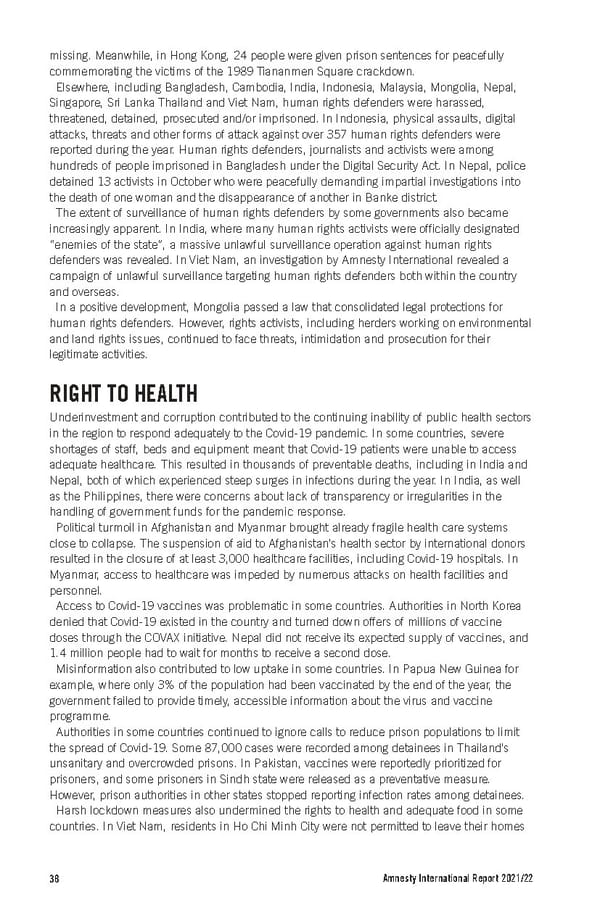missing. Meanwhile, in Hong Kong, 24 people were given prison sentences for peacefully commemorating the victims of the 1989 Tiananmen Square crackdown. Elsewhere, including Bangladesh, Cambodia, India, Indonesia, Malaysia, Mongolia, Nepal, Singapore, Sri Lanka Thailand and Viet Nam, human rights defenders were harassed, threatened, detained, prosecuted and/or imprisoned. In Indonesia, physical assaults, digital attacks, threats and other forms of attack against over 357 human rights defenders were reported during the year. Human rights defenders, journalists and activists were among hundreds of people imprisoned in Bangladesh under the Digital Security Act. In Nepal, police detained 13 activists in October who were peacefully demanding impartial investigations into the death of one woman and the disappearance of another in Banke district. The extent of surveillance of human rights defenders by some governments also became increasingly apparent. In India, where many human rights activists were officially designated “enemies of the state”, a massive unlawful surveillance operation against human rights defenders was revealed. In Viet Nam, an investigation by Amnesty International revealed a campaign of unlawful surveillance targeting human rights defenders both within the country and overseas. In a positive development, Mongolia passed a law that consolidated legal protections for human rights defenders. However, rights activists, including herders working on environmental and land rights issues, continued to face threats, intimidation and prosecution for their legitimate activities. RIGHT TO HEALTH Underinvestment and corruption contributed to the continuing inability of public health sectors in the region to respond adequately to the Covid-19 pandemic. In some countries, severe shortages of staff, beds and equipment meant that Covid-19 patients were unable to access adequate healthcare. This resulted in thousands of preventable deaths, including in India and Nepal, both of which experienced steep surges in infections during the year. In India, as well as the Philippines, there were concerns about lack of transparency or irregularities in the handling of government funds for the pandemic response. Political turmoil in Afghanistan and Myanmar brought already fragile health care systems close to collapse. The suspension of aid to Afghanistan’s health sector by international donors resulted in the closure of at least 3,000 healthcare facilities, including Covid-19 hospitals. In Myanmar, access to healthcare was impeded by numerous attacks on health facilities and personnel. Access to Covid-19 vaccines was problematic in some countries. Authorities in North Korea denied that Covid-19 existed in the country and turned down offers of millions of vaccine doses through the COVAX initiative. Nepal did not receive its expected supply of vaccines, and 1.4 million people had to wait for months to receive a second dose. Misinformation also contributed to low uptake in some countries. In Papua New Guinea for example, where only 3% of the population had been vaccinated by the end of the year, the government failed to provide timely, accessible information about the virus and vaccine programme. Authorities in some countries continued to ignore calls to reduce prison populations to limit the spread of Covid-19. Some 87,000 cases were recorded among detainees in Thailand’s unsanitary and overcrowded prisons. In Pakistan, vaccines were reportedly prioritized for prisoners, and some prisoners in Sindh state were released as a preventative measure. However, prison authorities in other states stopped reporting infection rates among detainees. Harsh lockdown measures also undermined the rights to health and adequate food in some countries. In Viet Nam, residents in Ho Chi Minh City were not permitted to leave their homes Amnesty International Report 2021/22 38
 Amnesty International Report 2021/22 Page 37 Page 39
Amnesty International Report 2021/22 Page 37 Page 39